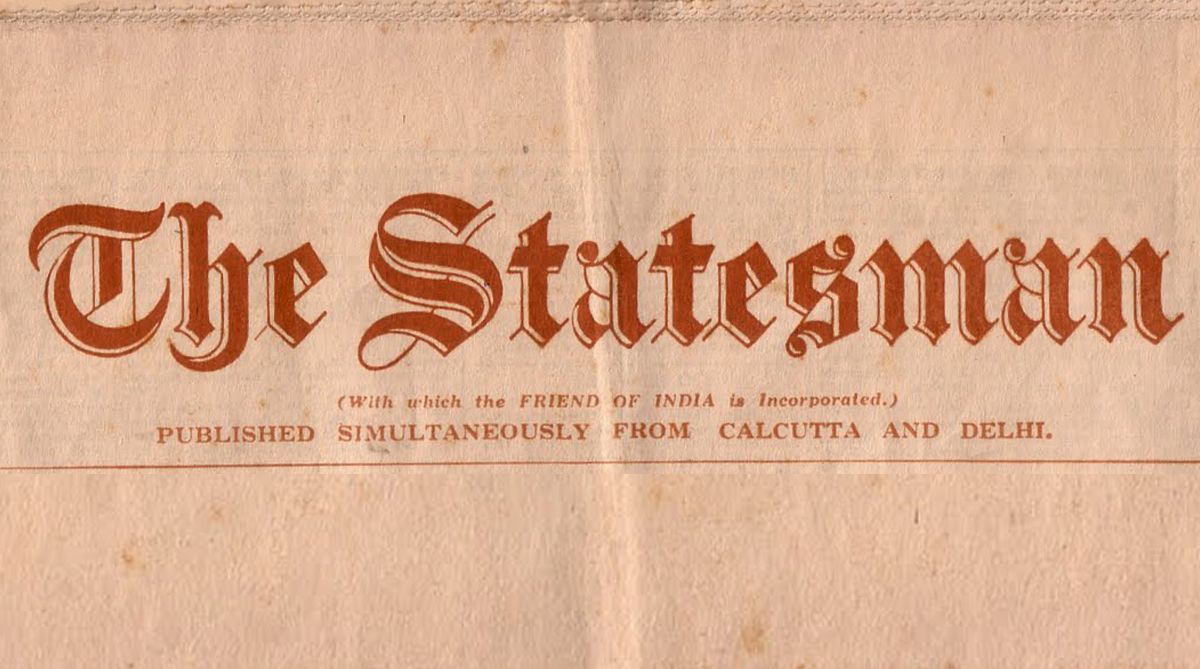A New Day, A New Dawn
There is a surprise for the readers. A special Poila Boishakh gift from none other than West Bengal chief minister Mamata Banerjee. Who has written a piece for this special edition.
On this day a century ago, these were some of the news items The Statesman readers got to read about India and the world.

OCCASIONAL NOTE
With reference to the letter signed “Would-be Passenger” which appeared in The Statesman recently, it is understood that the Government of India have communicated with the Home authorities with a view to the removal of the surcharge upon the already exceedingly heavy passage fares levied by the steamer companies in the case of the voyage between India and England. The result of their representations is not yet known, but as the impost was professedly levied in order to discourage or prevent people from travelling during war time, there seems to be no reason whatever for continuing it now that war dangers are a thing of the past, and the only considerations which ought to count are the accommodation available, and priority of the various claims for an early passage. Apart from this, the main hope of the unfortunate would-be passenger in India would appear to lie in the thirteen million tons of shipping which America has still to build to complete the programme laid down by the Emergency Fleet Corporation when it came into the field a couple of years ago. At a dinner given in his honour in New York the other day, Mr. Schwab, the Director- General of the Corporation, told his hearers that these 13 million tons would be duly forthcoming, and that “from now on we are going to build ships for economic permanency. We are not going to strive for speed, but we are going to build ships that will be the argosies of trade, sailing the seven seas in the days of the long peace.”
RAILWAY COLLISION AT BALLYGUNGE
Advertisement
On Tuesday, before the Police Magistrate of Sealdah, Ramkristo Paramanik, an Eastern Bengal Railway employee in charge of the flag station at Tiljala, between Beliaghata and Ballygunge stations, was charged under Section 101 of the Railway Act with negligently allowing a passenger train to collide with a goods train at the Tiljala crossing of the quadruple and the main lines. It appears that at 7 p.m. of the 27th November a goods train was running on the quadruple line from Ballygunge to Beliaghata and had passed the Tiljala crossing when a coupling gave way, with the result that the train parted, the rear portion moving back towards Ballygunge. The accused at first stopped the passenger train from leaving Beliaghata but subsequently allowed her to proceed, his idea being that there was enough room for her to run clear of the parted train. At the crossing, however, the engine of the passenger train ran into a portion of the nearest goods van, dragging the latter and the two following wagons along some distance before stopping. As a result of the impact two wagons capsized, seriously injuring a railway jamadar who died in the Campbell Hospital. The hearing was adjourned.
KIDDERPORE TRAM ACCIDENT
Late on Tuesday night, a serious tramway accident took place on Kidderpore main Road, near Jail Road junction, resulting in a European being seriously injured. It appears that at about 9-45 P.M. a Kidderpore car was travelling from Esplanade to Hastings and on nearing Jail Road junction a European rushed out suddenly from the Maidan, on the Fort side, on to the track. The driver put on the emergency brake, but in spite of this the motor struck the European and threw him forward on to the road, the trailer passing over his left arm. The injured man was removed to the Presidency General Hospital in an unconscious state, and his left arm was immediately amputated. From the appearance and dress of the man, it is believed that he is a Seaman. His home and other particulars have not been yet ascertained owing to his unconscious condition. The Hastings police are enquiring into the accident.
DISTRESS IN SYRIA
ALLAHABAD, JAN 15
The latest report from Syria show that the population is still suffering much distress, and deaths from hunger are almost as frequent as before the occupation. So far no communications have been organised between Syria and Egypt as has been done with Palestine, and it is almost impossible to send articles there. Sherif Faisal, son of the King of the Hedjaz, on his way to London, had a magnificent reception in Beyrout, when he arrived there from Damascus to go on board the steamer. The people went out in their thousands to meet him, and, taking the horses out of his carriage, dragged it into the town to the Serai. It was the greatest demonstration the town has ever witnessed, and eye-witnesses state that it was absolutely genuine and spontaneous. Meanwhile matters are progressing very satisfactorily in Palestine, where distress has for all practical purposes disappeared.
Advertisement